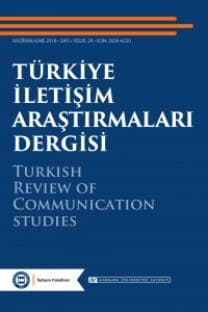Pandemi Çağında Sürdürülebilirlik: T.C. Kültür ve Turizm Bakanlığının Sosyal Medyada Proaktif Kriz İletişimi Üzerine Bir Araştırma
Sürdürülebilirlik, Proaktif Kriz Yönetimi, Pandemi, Turizm, Veri Madenciliği
Sustainability in the Age of Pandemic: A Study on Proactive Crisis Communication in Social Media by Republic of Turkey Ministry of Culture and Tourism
Sustainability, Proactive crisis management, Pandemic, Tourism, Data mining,
___
- Carvalho, B. H., Bertozzi, G. G., & Correa, C. (2020). Video games generating tourist demand: Italy and the Assassin’s Creed series. A. Sharma (Dü.) içinde, Sustainable tourism development: futuristic approaches. Apple Academic Press, Canadiana (ebook).
- Choe, Y., Wang, J., & Song, H. (2020). The impact of the middle east respiratory syndrome coronavirus on inbound tourism in South Korea towards sustainable tourism. Journal of Sustainable Tourism. doi:10.1 080/09669.582.2020.1797057
- El-Gohary, H. (2020). Coronavirus and halal tourism and hospitality industry: Is it a journey to the unknown? Sustainability, 12, 9260. doi:10.3390/su12219260
- Erdoğan, İ. (2012). Pozitivist metodoloji ve ötesi araştırma tasarımları niteliksel ve istatistiksel yöntemler. Ankara: Erk Yayınları.
- Fermani, A., Sergi, M. R., Carrieri, A., Crespi, I., Picconi, L., & Saggino, A. (2020). Sustainable tourism and facilities preferences: The sustainable tourist stay scale (STSS) validation. Sustainability(12), 9767. doi:10.3390/su12229767
- Gharavi, E., Nazemi, N., & Dadgostari, F. (2020). Early outbreak detection for proactive crisis management using Twitter data: COVID-19 a case study in the US. ArXiv. doi:abs/2005.00475
- Gharavi, E., Nazemi, N., & Dadgostari, F. (2020). Early Outbreak Detection for Proactive Crisis Management Using Twitter Data: COVID-19 a Case Study in the US. ArXiv. doi:abs/2005.00475
- Ioannides, D., & Gyimothy, S. (2020). COVID-19 crisis as an opportunity for escaping the unsustainable global tourism path. Tourism Geographies, 22(3), 624-632. doi:10.1080/14616.688.2020.1763445
- Marrewijk, M. v. (2003). Concepts and definitions of CSR and corporate sustainability: Between agency and communion. Journal of Business Ethics, 44, 95-105. doi:https://doi.org/10.1023/A:102.333.1212247
- Nunes, S., & Cooke, P. (2021). New global tourism innovation in a postcoronavirus era. European Planning Studies, 29(1), 1-19.
- Romagosa, F. (2020). The COVID-19 crisis: Opportunities for sustainable and proximity tourism. Tourism Geographies, 22(3), 690-694. doi:https://doi.org/10.1080/14616.688.2020.1763447
- Scoones, I. (2007). Sustainability. Development in Practice, 17(4-5). doi:10.1080/096.145.20701469609
- Shklovski, I., Burke, M., Kiesler, S., & Kraut, R. (2008). Technology adoption and use in the aftermath of hurricane Katrina in New Orleans. Position paper for the HCI for Emergencies workshop Conference on Human Factors in Computing (CHI 2008). Florence: CHI2008.
- Sjoberg, U. (2018). It is not about facts – it is about framing. The app generation’s information seeking tactics: Proactive online crisis communication. Journal of Contingencies and Crisis Management, 26(1), 127-137. doi:10.1111/1468-5973.12145
- Şahin, İ., & Güzel, F. Ö. (2020). Olumsuz güncel gelişmelerin ve krizlerin Türk turizmine etkileri: Profesyonel turist rehberlerinin değerlendirmeleri ve sektörel çözüm önerileri. İstanbul Gelişim Üniversitesi Sosyal Bilimler Dergisi, 7(2), 257-280. doi:https://dx.doi.org/10.17336/igusbd.541284
- Tang, Z., Miller, A. S., Zhou, Z., & Warkentin, M. (2021). Does government social media promote users’ information security behavior towards COVID-19 scams? Cultivation effects and protective motivations. Government Information Quarterly, 38(2), 101572. doi:https://doi.org/10.1016/j.giq.2021.101572
- Thornicroft, G., Mehta, N., Clement, S., Evans-Locko, S., Doherty, M., Rose, D., . . . Henderson, C. (2016). Evidence for effective interventions to reduce mental-health-related stigma and discrimination. The Lancet, 387(10023). doi:https://doi.org/10.1016/S0140-6736(15)00298-6
- Türkiye Cumhuriyeti Cumhurbaşkanlığı. (2022). Cumhurbaşkanlığı kabinesi. 02 23, 2022 tarihinde https://www. tccb.gov.tr/kabine/ adresinden alındı
- World Commission on Environment and Development. (1987). Our common future: Report of the world commission on environment and development. Oxford: Oxford University Press.
- World Tourism Organization. (2020). Supporting Jobs and Economies through Travel & Tourism – A Call for Action to Mitigate the Socio-Economic Impact of COVID-19 and Accelerate Recovery. Madrid: UNWTO.
- Yang, F. X., & Wong, I. A. (2020). The social crisis aftermath: tourist well-being during the COVID-19 outbreak. Journal of Sustainable Tourism, 29(6), 859-878. doi:10.1080/09669.582.2020.1843047
- Zheng, B., Lui, H., & Davison, R. M. (2018). Exploring the relationship between corporate reputation and the public’s crisis communication on social media. Public Relations Review, 44(1), 56-64. doi:https://doi. org/10.1016/j.pubrev.2017.12.006
- Başlangıç: 1992
- Yayıncı: Marmara Üniversitesi
Aysel ÇETİNKAYA, Zeynep DONDURUCU
Duygu KOTAN TÜRKDEN, Yeliz KUŞAY
Kurumsal Politik Aktivizm ve İtibar Riskleri: Medya Yansımalarıyla Starbucks Örneği
Bayram Bilge SAĞLAM, Egemen ERTÜRK
Simge ÜNLÜ, Lütfiye YAŞAR, Erdal BİLİCİ
Lutz PESCHKE, Seldağ GÜNEŞ PESCHKE, Yasemin GÜMÜŞ AĞCA, Seyedehshahrzad SEYFAFJEHİ, Irmak DÜNDAR, Yasin AYDOĞDU
Başak SOLMAZ, Bahar URHAN, Havva Nur TARAKCI, Doğan Can GAZAZ
